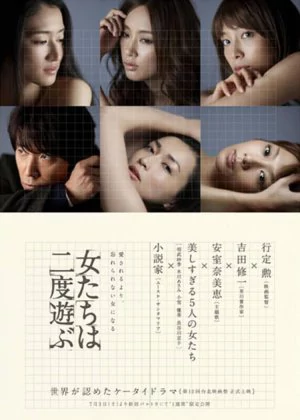Onnatachi wa Nido Asobu

I've reviewed quite a few anthology films before (Taipei 24h, Genius Party and Beyond, Phobia and Phobia 2, Ten Nights Of Dreams), but quite a few is never enough. Women Play Twice is a little different from regular anthology projects , but still a real treat for those who like Japanese dramas with a dash of romance. Brace yourself for six different women and their peculiar relationships, as seen through the eyes of a novelist.

People usually complain that anthology films lack coherence and consistency. To me it's one of the big perks, but for those people Women Play Twice might be the perfect compromise. Even though there are 6 different shorts, they are all directed by the same director and shot in a very consistent style. Each short handles a different type of woman as seen by one of the passing customers of a small bar. The result is a cozy little romantic drama that uses the variation of the different stories to stay clear from boredom setting in.
I usually write a mini-review for each separate short, that would be pretty impractical though as I would be repeating myself over and over again. There is not much difference in style and execution between the different shorts, keeping the quality of the film very consistent all the way through. Each short has a small climax near the end, but there isn't one short that really stands out or falls short compared to the other ones.
The subject for this film is also quite clear and defined. Each short zooms in on one particular woman who represents a certain type of female. Yukisada does handle his subject with a certain level of frivolity and it never becomes a real statement or life lesson trying to capture the whole female universe in one simple film. The film loses a little depth there, on the other hand I'm sure Yukisada would've lost himself if he tried to accomplish such a thing in the first place.

Visually Women Play Twice is a pretty nice-looking film. Nothing out of the ordinary, but each short features a few beautiful shots and compositions. The camera work is overall solid and controlled, not overly slick but subtle and refined. Yukisada remains quite close to the typical style of Japanese dramas, taking only some risks in the third short (I'm talking about a rather strange scene in a bath house), so if that's your thing you'll find plenty to enjoy here.
The soundtrack is another typical example of an Asian drama score, aiming for soft piano tunes and similarly easy on the ears music. As always, it goes well with the film but it's hardly challenging. It does little to define the film and even though it helps to set a warm and fuzzy atmosphere, I prefer more outspoken music.
Acting is overall good. There are many different actors and actresses here as each short features a different set of characters, but they make the best of the little screen time they have. By the time each short ends there's a considerable bond between the audience and the characters, adding some extra weight to the overall feel of the film. Again no-one jumps out, also nobody stays below the norm. Consistency is key here.

There was only one small thing bothering me when the end credits faded from the screen. Even though this is a film about women, each story is told from a male perspective, essentially becoming a film about how guys interpret women. Directors like Ryuichi Hiroki or Hiroshi Ishikawa get a lot closer to the essence of their characters when trying to bring female characters to life in their films, keeping to a female perspective at all times.
It does pull down the initial concept of this anthology a little, though if you're prepared to see Women Play Twice as a collection of 6 warm-hearted romantic shorts there's nothing to be disappointed about. Real anthology freaks should take notice that there isn't much difference in style and substance between the shorts, so if you're longing to be blown away from all different sides at once, it's better to skip this one altogether.
Considering the film as a whole it's not that much different from a normal feature-length Japanese drama, though the change in characters and perspectives do add some welcome variation. Production values are excellent, acting is great and Yukisada proves himself a competent director. An interesting film that deserves a broader audience, though a lacking release schedule and little fest coverage might be too much of a hurdle.